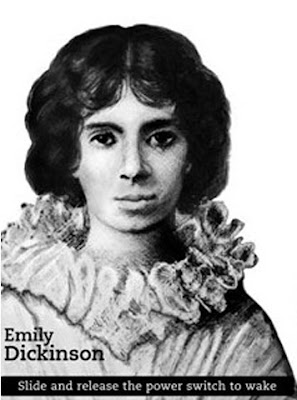 |
| And yet, her cold, dead eyes haunt me. |
Consider
a "simple" Dickinson poem:
Because I could
not stop for Death -
He kindly stopped
for me -
The carriage held
but just Ourselves -
And Immortality.
In
just the very first line, Dickinson conveys the sentiment of most mortals. We
have much to do, much we would wish to accomplish, much and more that we'd like
to see and experience. Some of us, toward the end, might welcome Death
(personified in this case), but a good majority of us, if given the chance,
would be too busy. And yet, Death is inexorable and undefeatable. Indeed, even
within the next two lines, Dickinson provides for not fight, no whining, no
excuse for her speaker. Death simply shows up, and the speaker is next in the
carriage. But in her final line, we have something of a paradox that is not
immediately explained—the speaker, Death and now Immortality are altogether. How
is that possible when the speaker is dead?
This
is only the first sentence—twenty words—and yet, Dickinson has set up an
atmosphere of quiet acceptance, the persona of Death inside His carriage, and
is already in pursuit of a meaning, or lack of meaning, to our mortal lives.
That's
just scraping the surface and it took me close to 200 words to explain a part
of Dickinson's 20.
Were
I to pursue these themes as part of a novel, I'd first have to set up the
character, the setting, and the plot which is easily a few thousand words
before we've even come to the rising action. This is just one
"little" poem. Nothing compared with some of the longer pieces like
"Rime of the Ancient Mariner" "The Wasteland" or
"Paradise Lost".

No comments:
Post a Comment